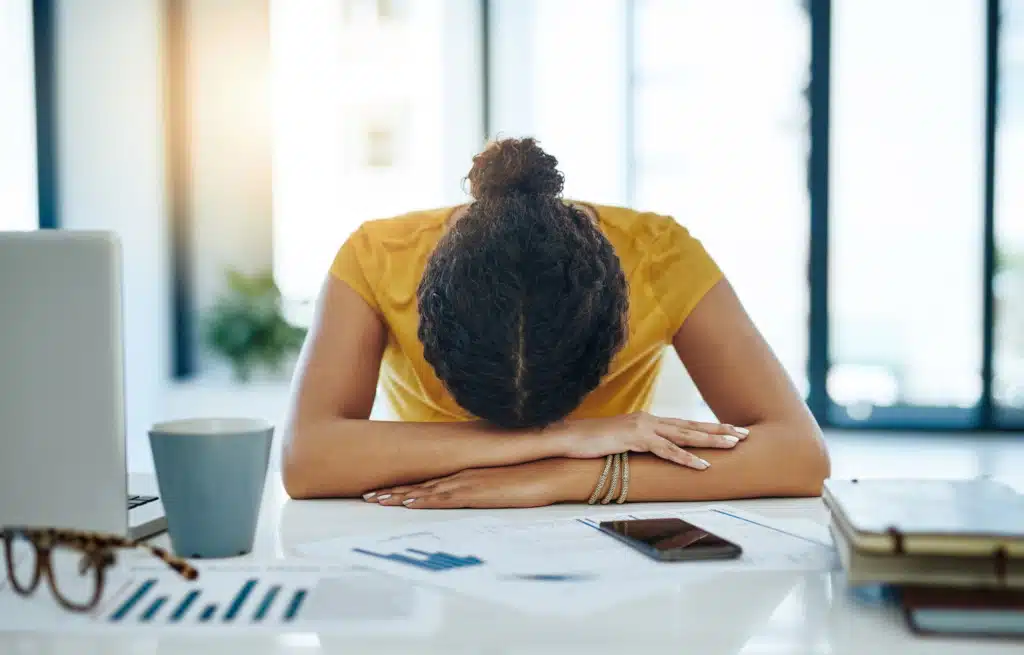If you have fibroid-related heavy periods, you’re probably no stranger to feeling spent. And we’re not talking about the type of fatigue that comes with not having enough hours in the day.
We’re talking about menstrual-related anemia. In fact, nearly half of women who suffer from both heavy periods and menstrual-related severe anemia were also found to have fibroids.1
Let that sink in.
Anemia may be “the norm” among women with fibroids, but it shouldn’t be, and it’s not a condition that can be ignored. Left untreated, abnormal menstrual bleeding to the point of becoming anemic can lead to many other health complications. The good news is iron-deficiency anemia is treatable and even preventable.
The type of anemia associated with abnormally heavy or prolonged menstrual bleeding is called iron-deficiency anemia. According to the National Heart, Lung, and Blood Institute, iron-deficiency anemia happens when you don’t have enough iron in your body to make healthy red blood cells.2 Without adequate iron, you can’t produce hemoglobin, a part of the red blood cell needed to carry oxygen throughout your body.3
Bleeding heavily during your period can make you lose blood cells and iron faster than your body can replace.3 As your body tries to make more hemoglobin, it uses up your iron stores.4 This process can increase your risk of iron-deficiency anemia.4
Knowing whether or not you have iron-deficiency anemia can be tricky. At mild or moderate stages, symptoms may not even show.2 At this point, many women who are anemic don’t even know it.
But as iron-deficiency anemia progresses, common signs and symptoms to look for include tiredness, weakness, dizziness, pale skin, and shortness of breath.3 Find a list of symptoms here. Left untreated, iron-deficiency anemia puts extra strain on the heart and can result in serious health complications, such as heart failure.2,3
If you think you may have iron-deficiency anemia caused by heavy periods, the road to recovery starts with talking to your doctor. This can help you receive a proper diagnosis for the anemia and get to the root of your heavy periods, so you can receive the right treatment.
In addition to treating the cause of heavy bleeding, your doctor will also take steps to treat your anemia. Depending on the severity, iron-deficiency anemia treatments may include doctor-prescribed iron supplements, intravenous (IV) iron therapy, or a blood transfusion.2
With your doctor’s guidance, preventative measures may also be recommended, such as making the following easy changes to your diet:3
Eat more iron-rich foods. Good sources of iron include lean meats, dark, leafy greens, and beans.
Incorporate vitamin C-rich foods that help with iron absorption, including citrus fruits (oranges and grapefruits), berries (strawberries, raspberries, blueberries), broccoli, and green peppers.5 Find a list of vitamin C-rich foods here.
Avoid coffee or tea with meals. These beverages can inhibit iron absorption.
Eat a balanced diet. Healthy food choices will help you get the nutrients needed to prevent iron-deficiency anemia.
Tell your doctor about any and all supplements you’re taking. Some supplements, like calcium, make it difficult for your body to absorb iron, whereas taking iron supplements without the guidance of a medical professional may result in getting too much iron, which can also be dangerous. Work with your doctor to find the best way to get the vitamins and minerals you need to be healthy.
Don’t ignore heavy periods that zap your energy. Get your life back by working with your doctor to find the right treatment for you.
REFERENCES
- Nelson, A. L., & Ritchie, J. J. (2015). Severe anemia from heavy menstrual bleeding requires heightened attention. Am J Obstet Gynecol, Jul;213(1):97.e1-97.e6.
- National Heart, Blood, and Lung Institute. (n.d.). Iron-deficiency anemia. Retrieved from https://www.nhlbi.nih.gov/health-topics/iron-deficiency-anemia
- S. Department of Health and Human Services Office on Women’s Health. (2019, Apr 1). Iron-deficiency anemia. Retrieved from https://www.womenshealth.gov/a-z-topics/iron-deficiency-anemia
- Mayo Clinic. (n.d.). Menorrhagia. Retrieved from https://www.mayoclinic.org/diseases-conditions/menorrhagia/symptoms-causes/syc-20352829
- S. National Library of Medicine. (2017, Jan 1). Vitamin C. Retrieved from https://medlineplus.gov/ency/article/002404.htm







